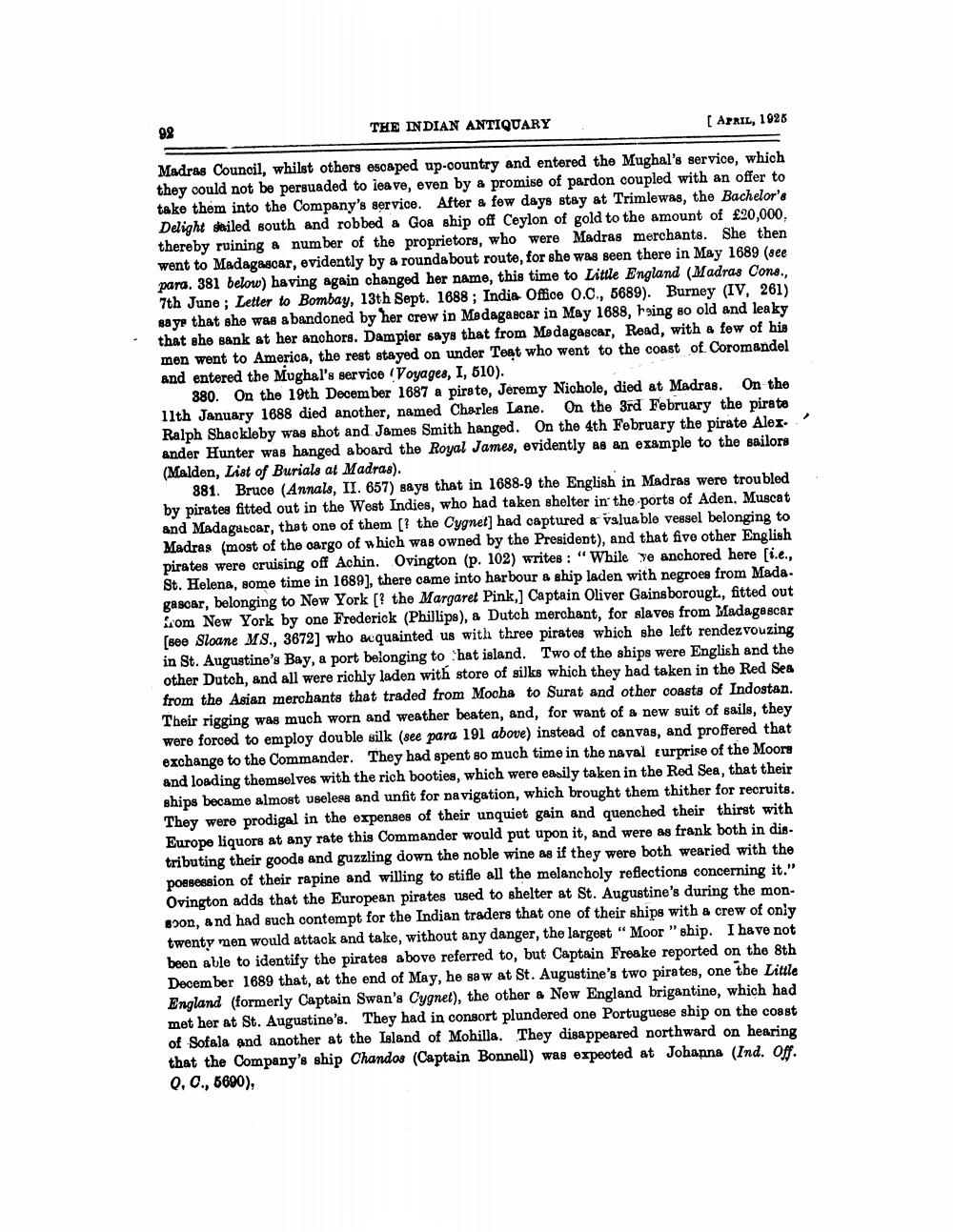________________
THE INDIAN ANTIQUARY
APRIL, 1926
Madras Council, whilst others escaped up-country and entered the Mughal's service, which they could not be persuaded to leave, even by a promise of pardon coupled with an offer to take them into the Company's service. After a few days stay at Trimlewas, the Bachelor's Delight sailed south and robbed a Goa ship off Ceylon of gold to the amount of £20,000. thereby ruining a number of the proprietors, who were Madras merchants. She then went to Madagascar, evidently by a roundabout route, for she was seen there in May 1689 (see para. 381 below) having again changed her name, this time to Little England (Madras Cone. 7th June ; Letter to Bombay, 13th Sept. 1688; India Office 0.C., 5689). Burney (IV, 261) saye that she was abandoned by her crew in Madagascar in May 1688, being so old and leaky that she bank at her anohors. Dampior says that from Modagascar, Read, with a few of his men went to America, the rest stayed on under Test who went to the coast of Coromandel and entered the Mughal's service Voyages, I, 510).
880. On the 19th December 1687 a pirate, Jeremy Nicholo, died at Madras. On the 11th January 1688 died another, named Charles Lane. On the 3rd February the pirate Ralph Shackleby was shot and James Smith hanged. On the 4th February the pirate Aler. ander Hunter was hanged aboard the Royal James, evidently as an example to the sailors (Malden, List of Burials at Madras).
881. Bruce (Annals, II. 657) says that in 1688-9 the English in Madras were troubled by pirates fitted out in the West Indies, who had taken shelter in the ports of Aden, Muscat and Madagascar, that one of them [? the Cygnet] had captured a valuable vessel belonging to Madras (most of the oargo of which was owned by the President), and that five other English pirates were cruising off Achin. Ovington (p. 102) writes : “While ye anchored here [i.e., St. Helena, some time in 1689), there came into harbour & ship laden with negroes from Mada. gascar, belonging to New York [? the Margaret Pink,] Captain Oliver Gainsborough, fitted out hom New York by one Frederick (Phillips), a Dutch merchant, for slaves from Madagascar (see Sloane MS., 3672] who acquainted us with three pirates which she left rendezvouzing in St. Augustine's Bay, a port belonging to hat island. Two of the ships were English and the other Dutch, and all were richly laden with store of silks which they had taken in the Red Sea from the Asian merchants that traded from Mocha to Surat and other coasts of Indostan. Their rigging was much worn and weather beaten, and, for want of a new suit of sails, they were forced to employ double silk (see para 191 above) instead of canvas, and proffered that exchange to the Commander. They had spent so much time in the naval eurprise of the Moore and loading themselves with the rich booties, which were easily taken in the Red Sea, that their ships became almost useless and unfit for navigation, which brought them thither for recruits. They were prodigal in the expenses of their unquiet gain and quenched their thirst with Europe liquors at any rate this Commander would put upon it, and were as frank both in distributing their goods and guzzling down the noble wine as if they were both wearied with the poesession of their rapine and willing to stifle all the melancholy reflections concerning it." Ovington adds that the European pirates used to shelter at St. Augustine's during the monson, and had such contempt for the Indian traders that one of their ships with a crew of only twenty men would attack and take, without any danger, the largest "Moor "ship. I have not been able to identify the pirates above referred to, but Captain Freake reported on the 8th December 1689 that, at the end of May, he saw at St. Augustine's two pirates, one the Little England (formerly Captain Swan's Cygnet), the other a New England brigantine, which had met her at St. Augustine's. They had in consort plundered one Portuguese ship on the coast of Sofala and another at the Island of Mohilla. They disappeared northward on hearing that the Company's ship Chandos (Captain Bonnell) was expected at Johanna (Ind. Off 0, C., 6690),




